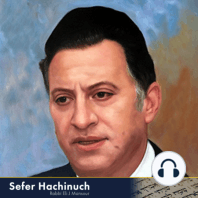20 min listen
Misva 235: The Obligation to Judge Properly
FromSefer Hachinuch
ratings:
Length:
20 minutes
Released:
Jul 11, 2022
Format:
Podcast episode
Description
The Torah commands in Parashat Kedoshim (Vayikra 19:15), “Be’sedek Tishpot Amitecha” – “You shall judge your fellow justly.” As the Sefer Ha’hinuch discusses, this command has several different applications. First, it requires a judge to treat both litigants equally, without according special respect to one over the other. (The Torah previously introduced a prohibition against favoritism in court; now the Torah adds an affirmative command to treat the litigants equally.) For example, a judge may not allow one litigant to speak as much as he wants, but instruct the other to speak briefly. Similarly, the judge may not allow one litigant to sit, while requiring the other to stand. If one litigant is dressed in expensive, fancy garments, and the other is dressed in simple clothes, the judge must instruct the first litigant to either provide equally fine clothing to the other litigant, or change into simple clothing, so they will both be equal. However, although both litigants must be treated equally, Halacha does establish an order of precedence when people are waiting for their cases to be tried. A case involving a widow or orphan is given precedence over others, and a case involving a Torah scholar takes precedence over cases involving unlearned individuals. A case involving a woman takes precedence over cases involving men. The command of “Be’sedek Tishpot Amitecha” also includes an obligation upon qualified to scholars to accept the responsibility of judging. If a person has the requisite knowledge and intellectual capabilities, he should not shy away from this important role, and should instead accept the job of judge. Additionally, this Misva requires all people – and not only courtroom judges – to judge their fellowman favorably, by giving them the benefit of the doubt whenever possible. If there are two sides to a story, we are required to assume the side which exonerates our fellow, rather than presume guilt. Explaining the reason behind this command, the Sefer Ha’hinuch writes that if a judge accords greater respect to one litigant than to the other, then people will be reluctant to bring their cases to court, seeing that the courts are not run fairly. And, when a litigant is in court, he might feel intimidated if he sees the judge treating the other party with greater respect, and will not present all his arguments and evidence. This will then result in an incorrect decision. The Sefer Ha’hinuch writes that society cannot run properly without an effective judicial system, and thus the Torah requires the judges to treat the litigants equally so that people will come to court and receive a correct ruling. As for the requirement that capable scholars agree to serve as judges, the Sefer Ha’hinuch explains that if worthy prospects refuse to serve as judges, then the positions will be filled by ignoramuses or corrupt judges, thereby undermining the effectiveness of the legal system. Giving the benefit of the doubt, the Sefer Ha’hinuch writes, serves to foster peace and friendship among people. This Misva applies in all times and in all places. The obligation to give one’s fellow the benefit of the doubt is binding upon all people, both men and women, whereas the elements of this Misva relevant to courtroom proceedings are, quite obviously, binding only upon judges or those capable of serving as judges.
Released:
Jul 11, 2022
Format:
Podcast episode
Titles in the series (100)
Misva #1: Periya Ve’riba – Procreation: Daily Sefer Hachinuch - Brought to you by itorah.com by Sefer Hachinuch
